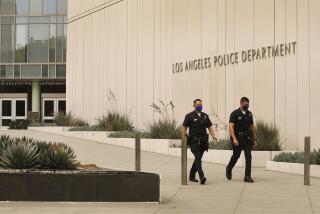Tickets from L.A.’s red-light cameras often go unpaid
Some 45% of red-light camera tickets issued in Los Angeles are currently unpaid, partly because holds are not placed on driver’s licenses and vehicle registrations for unsettled photo enforcement infractions, city officials said Wednesday.
The disclosure came as City Controller Wendy Greuel issued an audit that found the photo enforcement program bypassed some of the city’s most dangerous intersections and costs the city more than $1 million a year to operate, despite fines and fees that can exceed $500 per infraction.
LAPD officials said they learned during the audit that the state Department of Motor Vehicles has not been forcing payment of delinquent red-light camera fines during license and registration renewals. Other types of citations typically must be paid before renewals are granted, said Chief Charlie Beck, who appeared with Greuel at a news conference beneath a downtown red-light camera.
A DMV spokesman said motorists issued photo citations do not sign promises to appear in court, which are standard with moving violations issued by traffic officers. It is a failure to appear or pay the fine after signing a ticket that typically triggers a hold on a driver’s license renewal, said agency spokesman Armando Botello. He also said Los Angeles County Superior Court had not forwarded hold requests to the DMV for red-light camera tickets.
Allan Parachini, public information director for the Los Angeles court system, said the issue raised by the audit was being reviewed and he could not comment.
About 56,000 red-light camera tickets issued by the city are unpaid, according to the LAPD. Overall, about one-third of traffic tickets go unpaid, Beck said.
The LAPD is working with the courts and the DMV to correct the issue as part of a broader push to improve the program’s cost efficiency and safety benefits, Beck said.
Among other changes, Beck and Greuel said the city, which is planning to expand the program beginning next year, should focus camera enforcement on the most dangerous intersections. Both said the placement of the existing 32 camera systems was driven partly by politics and a desire to have at least one red-light camera in each of the city’s 15 council districts.
“We should deploy them like any other officer,” based on public safety needs, Beck said.
The audit also found that the LAPD had not developed data that conclusively show the cameras have improved safety. It noted one study that found half of the intersections equipped with cameras showed no reductions in accidents.
Beck agreed that better analysis is needed, but strongly defended the program for cutting fatalities at the targeted intersections. There have been no traffic deaths at the intersections since cameras were installed, he said.
Based on previous trends, “we would have had 10 fatalities,” he said. “This is why we were interested in red-light cameras in the first place.”
Beck stressed that the program is not intended to make money. But he and other officials hope to improve the program’s financial footing when a new contract to operate the cameras is issued next year.
Councilman Dennis Zine said it is difficult to make the program pay for itself because most of each fine goes to the state and county, with only about $159 per ticket coming to the city.
“I don’t believe the program works as well as it should,” he said.
Auditors found that about two-thirds of the city’s red-light camera tickets are for right-turn violations. Reducing straight-through red-light running, which can cause serious broadside collisions, has been a primary selling point for the cameras. But a 2008 Times investigation found that some cities, including Los Angeles, get most of their photo enforcement money from citing slower, rolling stop right turns, which many experts say cause fewer and less serious accidents.
Despite the audit’s critical findings, Greuel said the red-light camera program can be improved and is worthwhile if it “can prevent accidents and prevent even one fatality.”
More to Read
Sign up for Essential California
The most important California stories and recommendations in your inbox every morning.
You may occasionally receive promotional content from the Los Angeles Times.









